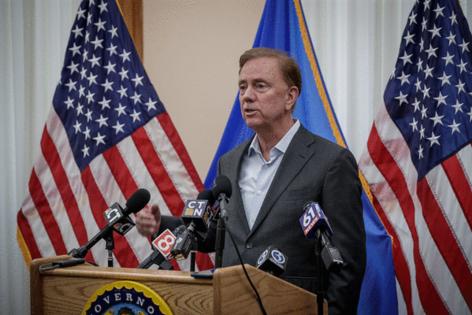Amid budget uncertainty from Trump, Connecticut House Speaker wants to put $1.4B surplus on hold
Published in News & Features
Fearing large budget cuts from the federal government, Democratic lawmakers called Wednesday for pausing the state’s fiscal guardrails to potentially allow $1.4 billion in future spending to cover shortfalls from Washington, D.C.
But Gov. Ned Lamont immediately rejected the idea, saying that it was premature to make any quick changes to the Connecticut guardrails that have helped generate budget surpluses and restored the state to fiscal stability after years of fiscal problems.
“Look, there’s some storm clouds out there. Absolutely,” Lamont told reporters outside his Capitol office in Hartford. “This is no time to panic. No time to declare a state of emergency, but we are ready.”
He added, “You know me. I’m not a tax-raising guy. We’ve got reserves. No way I can make up for the potential for all the cuts that are coming. But let’s just wait. We have a couple of months left in this session. I talk to red state governors every day. They’re as worried about Medicaid cuts as I am. … We can panic about the future, but we’ll have a much better visibility in the next month or two.”
Lamont’s comments were prompted by statements Wednesday morning by House Speaker Matt Ritter of Hartford, an influential Democrat who said the state should declare a state of emergency because of the fiscal turbulence in Washington, D.C.
Under current law, the state is expecting to transfer $1.4 billion in surplus funds later this year to the state’s pension funds in order to pay down debt. The $1.4 billion is collected under the “estimates and finals” portion of the state income tax and comes mainly from capital gains taxes on Wall Street that are paid largely by millionaires and billionaires in Fairfield County. The money is kept in a separate category under the “volatility cap” that was created on a bipartisan basis in 2017 by the legislature, which declared that lawmakers cannot spend the money and instead must transfer it to the underfunded pension funds.
Connecticut collected huge amounts of capital gains taxes with highly positive years on Wall Street in 2023 and 2024, but 2025 has proven to be the most volatile in recent history. The markets exploded Wednesday afternoon when President Donald J. Trump said he would pause his highly controversial tariffs for 90 days. The news immediately sent the stock indices soaring and led to the best single day on the technology-heavy Nasdaq index since January 2001.
During a Capitol press conference, Ritter said lawmakers should declare a fiscal emergency in order to change the guardrails to cover expenses from potential cuts by Trump’s administration. The measure needs a three-fifths vote in both chambers, meaning 91 votes in the state House of Representatives and 22 in the Senate.
“You want to take the volatility transfer and you want to freeze it,” Ritter told reporters before Lamont spoke later. “You don’t want it to go into the pension fund. You may need that money to backfill things. There might be some that are critical of that approach. It’s not an alarmist approach. It’s not promising an outcome. It’s hitting the pause button. … There’s so much that we don’t know that is coming at us on a daily basis, and sometimes the best thing you can do is just pause.”
Ritter added, “This is not being alarmist.”
Ritter, who leads the 102-member Democratic caucus in the House, was joined by House majority leader Jason Rojas of East Hartford.
“I think it’s being able to prepare for a level of uncertainty that I don’t think we’ve ever seen before — at least that I have ever seen in all my time in this building,” said Rojas, who was first elected in 2008. “We have a responsibility to respond to federal actions, and they’re causing a great deal of uncertainty, which leads to uncertainty for us in terms of how we’re able to do our work here.”
But House Republican leader Vincent Candelora of North Branford said the notion was premature.
“I think it’s a mistake,” Candelora said of Ritter’s idea. “We should not be dismantling the guardrails that have protected Connecticut from over-spending, protected us from tax increases. In the long run, that’s the direction we are going to be headed in.”
Before Lamont spoke, Senate Republican leader Stephen Harding of Brookfield called upon the governor to take a strong stance on the guardrails.
“Gov. Lamont, the focus is on you now,” Harding said. “Stand strong against your fellow Democrats who want to break the guardrails. Stand strong against the job-crushing tax hikes that this will cause. Gov. Lamont, Connecticut needs you to lead. No more historic tax hikes.”
Senate President Pro Tempore Martin Looney, a New Haven Democrat, expressed support.
“The economic turmoil and federal cuts handed down by the Trump administration have begun to create a cascading emergency for Connecticut’s budget,” Looney said. “I will continue to work closely with Speaker Ritter and Governor Lamont to take whatever action is necessary to best protect Connecticut families.”
_____
©2025 Hartford Courant. Visit courant.com. Distributed by Tribune Content Agency, LLC.







Comments